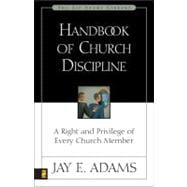
Note: Supplemental materials are not guaranteed with Rental or Used book purchases.
Purchase Benefits
What is included with this book?
| Contents | |
| Preface | |
| Introduction | |
| 1. What Is Church Discipline? | |
| 2. Preventive Discipline | |
| 3. Corrective Discipline | |
| Four or Five Steps? | |
| Confidentiality | |
| All Steps, Always? | |
| 4. Self-Discipline | |
| The Beginning and the End | |
| 5. One-on-One | |
| Informal Discipline | |
| The Meaning | |
| Going to the Offender | |
| What to Say | |
| Privacy | |
| Reconciliation | |
| Every Little Thing? | |
| 6. One or Two Others | |
| Witnesses Only? | |
| What the Counselor/Witnesses Do | |
| 7. Tell It to the Church | |
| Telling the Church | |
| The Elders' Part | |
| How Does It Work? | |
| 8. Removal From the Midst | |
| “As a Heathen and a Tax Collector” | |
| The Terms and the Reality | |
| Procedures and Records | |
| Mourning | |
| 9. Restoring to Fellowship | |
| Forgiveness | |
| Assistance | |
| Reaffirmation of Love | |
| 10. Cross-Congregational Discipline | |
| What If the Church Defaults? | |
| Respecting Discipline | |
| Handling Church Hoppers | |
| Divisive Persons | |
| Liberal Churches? | |
| 11. Encouragement | |
| Christ's Presence in the Process | |
| Answered Prayer | |
| Heaven and Earth | |
| How to Go About It | |
| Conclusion | |
| Scripture Index |
The New copy of this book will include any supplemental materials advertised. Please check the title of the book to determine if it should include any access cards, study guides, lab manuals, CDs, etc.
The Used, Rental and eBook copies of this book are not guaranteed to include any supplemental materials. Typically, only the book itself is included. This is true even if the title states it includes any access cards, study guides, lab manuals, CDs, etc.
Excerpted from Handbook of Church Discipline: A Right and Privilege of Every Church Member by Jay Edward Adams, Jay E. Adams
All rights reserved by the original copyright owners. Excerpts are provided for display purposes only and may not be reproduced, reprinted or distributed without the written permission of the publisher.